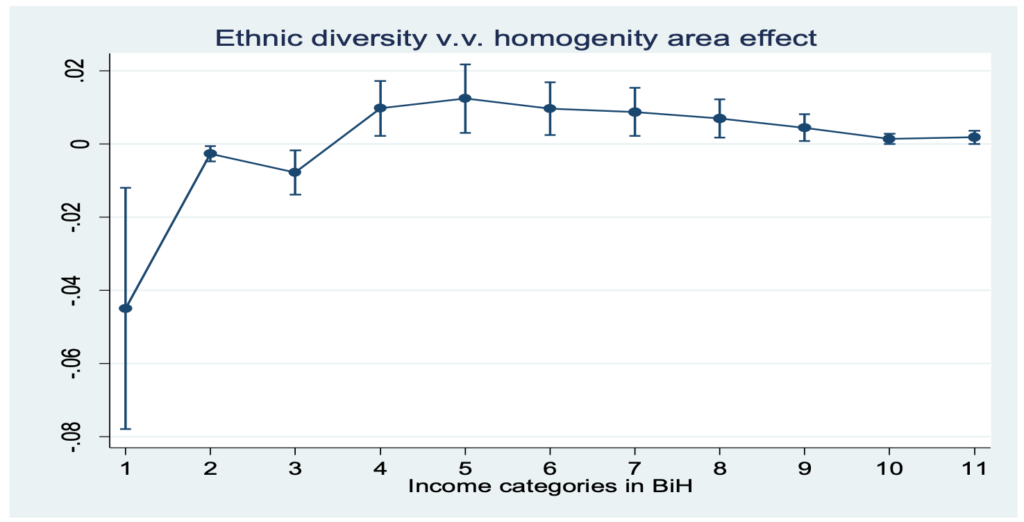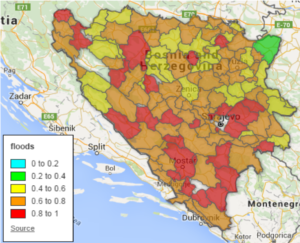Ethnic homogeneity in BiH: prosperity or poverty?
Ethnic homogeneity in BiH: prosperity or poverty?
Ethnic diversity is an ongoing research topic in economics, investigated both at macro and micro-economic levels, and is a topical issue among policy makers. Motivated by a growing body of literature that investigates the effect of ethnic diversity in economics, we conducted three targeted surveys in BiH over the period 2011-2015 to explore the economic consequences on individuals, families, businesses and society. BiH is a country that has been ethnically diverse for centuries, yet, two decades ago, this ethnically heterogenous composition was changed as a result of the Bosnian war (1992-1995). As yet, the social and economic outcomes of consequently reduced ethnic diversity in BiH remain unknown. Thus, in our three empirical studies, we investigate the following:
What is the effect of ethnic diversity on individual and family income in BiH?
What is the effect of ethnic diversity on business growth in BiH?
What is the effect of ethnic diversity on pro-social behaviour of citizens in BiH?
The outcomes of all three research studies indicate a positive role of ethnic diversity in BiH economy and society. In BiH, ethnic diversity, where preserved, is not a threat, but an important resource for entrepreneurial growth aspirations, pro-social behaviour of citizens, and individual and family economic well-being. These studies send a powerful policy message that ethnically more diverse areas in BiH are stronger economically. As a consequence, policies designed to encourage and support ethnic inclusion in otherwise homogenous areas have the potential to be welfare enhancing.
What does economic theory suggest?
The literature implies that ethnic diversity may have both positive or negative effects on economic outcomes. On the one hand, where ethnic diversity is associated with fragmentation and conflict, it is likely to impact negatively on economic performance. The main argument is that ethnic diversities, fractionalisation, conflicts and prejudices can override economic incentives, leading to poor economic choices, policies and outcomes. On the other hand, a different perspective is that most developed countries, regions and cities today are ethnically diverse. Proponents of this approach explain that a diverse ethnic mix may bring various abilities, different experiences, a variety of cultures and traditions, a spectrum of religious beliefs and practices, and multidimensional ways of thinking, which together may lead a more diverse society towards greater innovation, creativity and better economic performance. The empirical literature includes support for both hypotheses; hence, more research is needed for specific contexts – as it is BiH – a post-conflict society where the economic consequences of ethnic pluralism vs. ethnic homogeneity remain unknown.
The effect of ethnic diversity on individual and family income in BiH?
This study is based on BiH representative cross-sectional survey data (2012) to investigate the effect of ethnic diversity on individual and household incomes (Efendic and Pugh, 2018). We estimate endogenous and exogenous earnings functions and find that ethnic diversity within neighbourhoods – where it exists – is not an economic threat but is rather associated with positive outcomes for individuals and families; in particular, lower probabilities of being in the lowest income categories and higher probabilities of being in medium and higher income categories (Figure 1). These findings have particular implications for poverty reduction in BiH. Hence, further homogenization from the existing level of ethnic diversity might impose reduced incomes.
Figure 1. Ethnic diversity and income in BiH

The effect of reduced ethnic diversity on business development in BiH?
This research uses representative data on young companies in BiH obtained through a specially designed cross-sectional survey implemented in 2011. We estimate number of cross-sectional growth aspirations models where we include economic determinants and the variable capturing the effect of ethnic diversity. This business study (Efendic et al., 2015) finds that ethnically mixed areas are characterised by systematically greater growth aspirations of entrepreneurs in comparison to more homogenous areas. We conclude that ethnic pluralism is an opportunity, not a danger; in the regions where ethnic pluralism is preserved, business aspirations are stronger. Economic growth in the future is going to be higher in ethnically diverse than in ethnically homogenous regions. Thus, a greater ethnic diversity in BiH works as a source of business development.
The effect of ethnic diversity on pro-social behaviour of citizens in BiH?
In May 2014, BiH was affected by unforeseen floods, the like of which had not been seen in this region. In one day, much of the country was under the water, with land-slides destroying whole villages, but surprisingly, only a few lives were lost. This is not only thanks to a functional institutional response but, even more, thanks to the citizens who organized themselves in a day, and managed to save endangered lives, wealth, animals, and even public and private institutions. This was a period when people started acting together to help others, not just their neighbours or family, but people on the other side of the country to whom they had no relations, while ‘ethnic boundaries’ between people looked less relevant. Such a wide scale of pro-social positive response to the crisis inspired our investigation.
Figure 2. BiH pro-social behaviour map in the flood period

This empirical study is based on nationally representative cross-sectional survey data collected in 2015 (Efendic, 2018). We estimate endogenous structural econometric models and find that the ethnic diversity of personal contact networks was a relevant determinant of greater engagement of BiH citizens in these pro-social activities. There is a clear indication that interethnic networking of individuals is having a positive effect on pro-social activites on the ground, even in the areas where the conflict has an ethnic background. In this vein, enhancing interethnic relations in this post-conflict society is an investment into social capital that can be utilized when it is most needed.Figure 2 shows different levels of citizens’ engagement in the period of floods, in the range 0-1, which corresponds to 0-100%. The main message is that the pro-social activity of citizens was systematically identified throughout the whole country, but not only in the flooded areas.
Principal researcher
Adnan Efendic is Professor of Economics at University of Sarajevo, School of Economics and Business and affiliate fellow at CERGE-EI, Prague. He obtained his PhD at Staffordshire University Business School, England, 2010, field: institutional economics. He has published several papers in world class scientific journals and several books with respected international publishers. He is Editor-in-chief of South East European Journal of Economics and Business and member of editor board in Post-Communist Economies journa
l.
Ref
erences
Efendic, A. and Pugh, G. (2018). The effect of ethnic diversity on income – an empirical investigation using survey data from a post-conflict environment. Economics: The Open-Access, Open-Assessment E-Journal, 12 (2018-17): 1–34. http://www.economics-ejournal.org/economics/journalarticles/2018-17
Efendic, A., Mickiewicz, T., Rebmann, A. (2015). Growth aspiration and social capital: young firms in a post-conflict environment. International Small Business Journal 33(5), 537-561. https://journals.sagepub.com/doi/abs/10.1177/0266242613516987?journalCode=isbb
Efendic, A. (2018). The role of economic and social capital during the floods in Bosnia and Herzegovina. In: Dzihanic, V. and Solska, M. (eds.) (2018). Crisis Governance in Bosnia and Herzegovina, Croatia and Serbia. The Study of Floods in 2014. Bern: Peter Lang, pp: 125-149. https://www.peterlang.com/view/title/63204

The preceding text is copyright of the author and/or translator and is licensed under a Creative Commons Attribution-NonCommercial-NoDerivs 3.0 Unported License.

